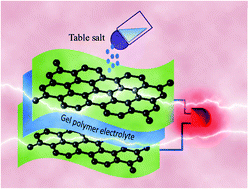Kitchen sea salt or table salt is used every day by cooks as a food seasoning. Here, it is introduced into a gel polymer (poly(vinyl) alcohol (PVA)-table salt) for use as an electrolyte, and an electrode was constructed from graphene nanosheets for use as symmetrical solid-state supercapacitors. The graphene sheets are prepared by a pulse control plasma method and used as an electrode material, and were studied by X-ray diffraction (XRD), Raman spectroscopy, as well as scanning electron microscopy (SEM), transmission electron microscopy (TEM) and X-ray photoelectron spectroscopy (XPS). A specific capacitance of 117.6 F g−1 at 5 mV s−1 was obtained in a three electrode system with table sea salt as an aqueous electrolyte. For a symmetrical solid-state supercapacitor: graphene/PVA-table sea salt/graphene gave a good specific capacitance of 31.67 F g−1 at 0.25 A g−1 with an energy density of 6.33 W h kg−1 at a power density of 600 W kg−1, with good charge–discharge stability, which was 87% after 8000 cycles. Thus, the development of table sea salt as an environmentally friendly electrolyte has a good potential for use in energy storage applications.

